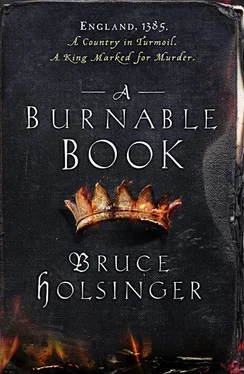Bruce Holsinger - A Burnable Book
Здесь есть возможность читать онлайн «Bruce Holsinger - A Burnable Book» — ознакомительный отрывок электронной книги совершенно бесплатно, а после прочтения отрывка купить полную версию. В некоторых случаях можно слушать аудио, скачать через торрент в формате fb2 и присутствует краткое содержание. Год выпуска: 2013, Издательство: HarperCollins Publishers, Жанр: Исторический детектив, на английском языке. Описание произведения, (предисловие) а так же отзывы посетителей доступны на портале библиотеки ЛибКат.
- Название:A Burnable Book
- Автор:
- Издательство:HarperCollins Publishers
- Жанр:
- Год:2013
- ISBN:нет данных
- Рейтинг книги:4 / 5. Голосов: 1
-
Избранное:Добавить в избранное
- Отзывы:
-
Ваша оценка:
- 80
- 1
- 2
- 3
- 4
- 5
A Burnable Book: краткое содержание, описание и аннотация
Предлагаем к чтению аннотацию, описание, краткое содержание или предисловие (зависит от того, что написал сам автор книги «A Burnable Book»). Если вы не нашли необходимую информацию о книге — напишите в комментариях, мы постараемся отыскать её.
A Burnable Book — читать онлайн ознакомительный отрывок
Ниже представлен текст книги, разбитый по страницам. Система сохранения места последней прочитанной страницы, позволяет с удобством читать онлайн бесплатно книгу «A Burnable Book», без необходимости каждый раз заново искать на чём Вы остановились. Поставьте закладку, и сможете в любой момент перейти на страницу, на которой закончили чтение.
Интервал:
Закладка:
‘You took an oath, Master Grimes,’ she seethed. ‘In the mayor’s presence himself you swore to God you’d protect my brother, keep him from harm. Now you’d as lief kill him.’
Grimes lifted a cleaver, fingered its edge. ‘Never cut up a maudlyn in all my day.’ He looked over at the beef carcass. ‘Can’t imagine there’s much trouble to it, though.’ He smiled. ‘Now get back to London, sweetmeats.’
She edged out of the stall with a final glance at Gerald. He stood in the doorway to the apprentices’ shack, his face so much older than it should have looked. Once she was gone Grimes would paint it good. The burden of it all settled on her: a murder, a missing friend, a brother liable to be brained at any moment and clearly troubled by something he wouldn’t reveal.
Yet there was one man who might be capable of putting things right for Gerald, Eleanor speculated as she walked up toward the bridge, get him out of all of this. A kind man, from all she’d heard. A man with the authority to remove her brother from his Southwark dungeon and put him with a kinder master in London. As she passed back over the bridge she thought about this man, knowing, at least, where to find him; trusting, for she had to, in his kindness.
THIRTEEN
St Mary Overey, Southwark
On the morning after Low Sunday I rose early, awakened by the buzz of the priory bell, cracked and unreplaced since the belfry fire two years before. My appointment with Braybrooke would not be for hours, but I left the house anyway, absorbing the quiet din of these Southwark streets at dawn, already alive with the work that sustained the greater city over the river. Here the trades commingled with none of London’s attempt at logic, the shops of haberdashers and carpenters, tanners and tawyers, fishmongers and smiths, coopers and brewers all side by side, spewing smells and sounds and petty rivalries even as small creeks of rubbish spilled out of alleys between them. I stepped into a baker’s shop and purchased two sweetbuns for the trip. At the river landing I paid my pennies and hopped on a common wherry, joining a few others westward bound.
I found a seat for the float to Fulham, and as the wherry passed St Bride’s on the north bank I squinted across the wide span at a group of young men in skiffs. They were tilting, I realized, their target a square of beaten tin suspended from the lampstick of an anchored barge. Four oarsmen per skiff made wide circles around the craft, the lanceman at the bow, loose on his knees; then, a speedy approach, the lance held at the shoulder, the skiff keeping steady over the rises; and finally impact, as the dulled point of the lance struck the tin, the noise carrying over the water. An awkward game, yet several of the young men were quite skilful with their lances, taking the applause of their mates with exaggerated pride.
These, I thought with a shudder, would be the first Englishmen killed were a French invasion force to sail up the Thames from Gravesend and destroy the bridge. How would these boys spend their final moments? Would they turn tail, ditching their skiffs on the bank, fleeing through the streets? Or would they stand and fight, tilting at warships in a futile attempt to save London?
At the quay of Patrisey I changed wherries and thought ahead to my appointment with the bishop. Knowing Braybrooke as I did, I could expect a meeting full of venom and insinuation, of parries and feints. Tread softly, I warned myself.
With a slow turn toward the north bank, we passed lines of oak and elm towering over the terraced lawns leading up to the bishop’s great house, which commanded an enviable position over the river. Above the dock was a pavilion trimmed in banners of silk, cloth of gold, and sable, displaying Braybrooke’s mascles over his personal barge.
As the bank came into view I saw not only Braybrooke’s colours, but the Earl of Oxford’s as well. The wherry bumped in just up-river from Braybrooke’s barge, and as I stepped up the bank I saw Robert de Vere striding across the lower terrace. Normally Oxford moved about with a larger retinue, yet his only companion that day was Sir Stephen Weldon. I bowed as the earl approached. He looked me over, his discomfort apparent as he waved me to my full height.
‘Gower,’ he finally said.
‘Your lordship.’ I nodded to Weldon. ‘Sir Stephen.’
Weldon returned the nod.
‘How is his lordship the bishop?’ I asked them.
‘Supervising plantings on the upper terrace,’ said the earl, forcing a smile. ‘Seems there are some questions about the rigor of the vines he’s got in from Bordeaux. But he’s still determined to pull a decent clairet from our English clay.’
I winced. ‘Pretres anglais ont toujours aime le vin. ’
‘As long as I’m not forced to sample the result,’ said Oxford.
Weldon feigned choking, a comic gesture that broke the awkwardness. ‘I do miss the wines of Italy,’ the knight said, his eyes crinkling with the memories. For years Weldon had served with Sir John Hawkwood before his permanent return to England in the fifth year of Richard’s reign. Weldon was taller than Oxford, and thinner, with a studied casualness to his stance. He wore little in the way of livery, a small badge on his right breast the only mark of his station. ‘Perhaps England’s next war might be fought over France’s vine rather than its cities.’
‘A welcome suggestion,’ I said, choosing to take Weldon’s courteous demeanour as sincere. ‘For that I’d happily lift a sword.’
With these elevated nothings we parted, and I was left wondering what business the earl could possibly have at Fulham. To my knowledge, all Oxford and London shared was a mutual hatred of John of Gaunt.
I was directed to an upper side terrace, reached after a circuitous route through a network of gravel walks. I found the Bishop of London on his knees, thinning roses. At a discreet distance stood two servants bearing bowls, flagons, and gardening tools for the bishop’s use, and, closer, four additional men holding his robes, mitre, and cap: two friars, a canon of some kind, and Fulham’s head gardener, the last with his hands crossed tightly in front of him as Braybrooke assaulted his art with the unpractised hand of a knight shearing sheep. The canon, noticing me, cleared his throat. Braybrooke turned.
‘Gower.’ The bishop was a man of awkward, treeish height; to see him on his knees, his meaty hands scooping dirt from the ground, was something new.
‘Your lordship.’
Braybrooke loosened a stone. ‘How’s Gaunt?’
‘I would not know, your lordship,’ I said. ‘I caught a passing glimpse of him the other week at La Neyte, but that is all.’
Another stone, a spray of soil. ‘Can’t be comfortable for the duke, can it, being a constant object of suspicion?’ I listened as the bishop muttered over the royal troubles of the last year, still the talk of the realm. He had been at the council tournament in February, and I learned a new detail about the aftermath of Oxford’s plot against Lancaster. If not for the peacemaking interventions of Countess Joan, the bishop claimed, either Gaunt or King Richard would surely have been dead by now. And with the king still young, always gullible, and increasingly unpredictable in his alliances, things could only worsen.
‘What about you, Gower?’ the bishop said. ‘You’re content with your own alliances?’
‘I’m for the king, your lordship,’ I said cautiously. ‘From whatever faction he comes, I’m for the king.’
‘An easy vow.’ He packed dirt into the new hole. ‘For a man who takes such stark moral stands in his verse, you’re remarkably reluctant to choose sides.’
My jaw tightened.
Читать дальшеИнтервал:
Закладка:
Похожие книги на «A Burnable Book»
Представляем Вашему вниманию похожие книги на «A Burnable Book» списком для выбора. Мы отобрали схожую по названию и смыслу литературу в надежде предоставить читателям больше вариантов отыскать новые, интересные, ещё непрочитанные произведения.
Обсуждение, отзывы о книге «A Burnable Book» и просто собственные мнения читателей. Оставьте ваши комментарии, напишите, что Вы думаете о произведении, его смысле или главных героях. Укажите что конкретно понравилось, а что нет, и почему Вы так считаете.












